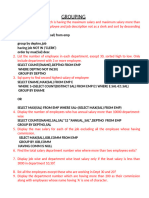0 ratings0% found this document useful (0 votes)
34 viewsSelect Top - LVL SUM SAL From Select Connect - by - Root MNGR As Top - LVL SAL From Emp Connect by Prior Emp MNGR Group by Top - LVL
This SQL query uses a hierarchical query to first identify the top-level managers in a table with employee, manager, and salary columns. It then uses a subquery to retrieve the salaries of all employees connected to each top-level manager. Finally, it sums the salaries and groups the results by each unique top-level manager to calculate the aggregate salary for all employees reporting up to each top-level manager.
Uploaded by
Vamshi KrishnaCopyright
© © All Rights Reserved
We take content rights seriously. If you suspect this is your content, claim it here.
Available Formats
Download as DOCX, PDF, TXT or read online on Scribd
0 ratings0% found this document useful (0 votes)
34 viewsSelect Top - LVL SUM SAL From Select Connect - by - Root MNGR As Top - LVL SAL From Emp Connect by Prior Emp MNGR Group by Top - LVL
This SQL query uses a hierarchical query to first identify the top-level managers in a table with employee, manager, and salary columns. It then uses a subquery to retrieve the salaries of all employees connected to each top-level manager. Finally, it sums the salaries and groups the results by each unique top-level manager to calculate the aggregate salary for all employees reporting up to each top-level manager.
Uploaded by
Vamshi KrishnaCopyright
© © All Rights Reserved
We take content rights seriously. If you suspect this is your content, claim it here.
Available Formats
Download as DOCX, PDF, TXT or read online on Scribd
You are on page 1/ 1
Q) I have table with columns (Employee, Manager, Salary).
Need to calculate
aggregate salary for all employees corresponding to top-level managers in one
SQL.
ANS) SELECT TOP_LVL, SUM(SAL) FROM (SELECT CONNECT_BY_ROOT MNGR AS TOP_LVL, SAL
FROM EMP CONNECT BY PRIOR EMP = MNGR) GROUP BY TOP_LVL
select
seq#, event, p1, p2, p3
from
v$session_wait_history
where
sid = <yoursid>
order by seq;
You might also like
- LEAD LAG LISTAGG TO_CHAR CAST JOINS TYPESNo ratings yetLEAD LAG LISTAGG TO_CHAR CAST JOINS TYPES6 pages
- Answers On Group by and Having Clause: Select Sum (Sal), Job From Emp Group by Job82% (39)Answers On Group by and Having Clause: Select Sum (Sal), Job From Emp Group by Job5 pages
- Performance Tuning: Identifying Performance Bottleneck Taking Corrective Actions100% (1)Performance Tuning: Identifying Performance Bottleneck Taking Corrective Actions21 pages















































